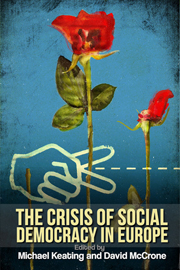Book contents
- Frontmatter
- Contents
- List of tables and figures
- About the contributors
- Preface
- 1 The crisis of social democracy
- 2 The Long Depression, the Great Crash and socialism in Western Europe
- 3 Social democracy in crisis: outlining the trends in Western Europe
- 4 The positions and fortunes of social democratic parties in East Central Europe
- 5 Rethinking public expenditure from a social democratic perspective
- 6 Social democracy in crisis? What crisis?
- 7 Can the Swedish social model survive the decline of the social democrats?
- 8 Multiculturalism, right-wing populism and the crisis of social democracy
- 9 Labour markets, welfare states and the dilemmas of European social democracy
- 10 Class politics and the social investment welfare state
- 11 Labour, skills and education in modern socio-economic development: can there be a social democratic economic and industrial policy in a globalised economy?
- 12 From single market to social market economy: is there room for solidarity?
- 13 Social democracy and security
- 14 Multilevel social democracy: centralisation and decentralisation
- 15 Conclusion
- Bibliography
- Index
5 - Rethinking public expenditure from a social democratic perspective
Published online by Cambridge University Press: 05 October 2013
- Frontmatter
- Contents
- List of tables and figures
- About the contributors
- Preface
- 1 The crisis of social democracy
- 2 The Long Depression, the Great Crash and socialism in Western Europe
- 3 Social democracy in crisis: outlining the trends in Western Europe
- 4 The positions and fortunes of social democratic parties in East Central Europe
- 5 Rethinking public expenditure from a social democratic perspective
- 6 Social democracy in crisis? What crisis?
- 7 Can the Swedish social model survive the decline of the social democrats?
- 8 Multiculturalism, right-wing populism and the crisis of social democracy
- 9 Labour markets, welfare states and the dilemmas of European social democracy
- 10 Class politics and the social investment welfare state
- 11 Labour, skills and education in modern socio-economic development: can there be a social democratic economic and industrial policy in a globalised economy?
- 12 From single market to social market economy: is there room for solidarity?
- 13 Social democracy and security
- 14 Multilevel social democracy: centralisation and decentralisation
- 15 Conclusion
- Bibliography
- Index
Summary
Introduction
There are waves of public mood about public expenditure; it seems to be in fashion or strongly out of fashion. This contributes to alternating periods of plenty and famine in some countries, of which the United Kingdom provides a striking example. There is not only strong polarisation in periods of famine but also inadequate scrutiny during periods of plenty. Contemporary UK commentary, for example, exhibits conflicting narratives:
Labour's fiscal policy [1997–2010] amounted to little more than bribes to cultivate a client state of public sector employees and the feckless underclass.
(Mowbray 2012)Over a generation, social security has been rebranded as welfare, an undeserved gift rather than a right.
(Clark 2012)I think there's a very deliberate policy across all of the public sector to roll back the achievements that have been made in this country [United Kingdom] since the second world war – including the [National Health Service] – and that financial austerity is being used to pursue an agenda aimed at dismantling the state.
(Gabriel Scally, quoted in Campbell 2012)These quotations – quite mildly expressed compared to what can be found in the media and on the Web – contextualise this analysis of public expenditure from a social democratic perspective.
Social democracy presupposes a degree of confidence in the competence, legitimacy and accountability of state institutions. It requires a sense of common purpose and of belonging and inclusiveness, which together underpin social solidarity.
- Type
- Chapter
- Information
- The Crisis of Social Democracy in Europe , pp. 68 - 86Publisher: Edinburgh University PressPrint publication year: 2013



